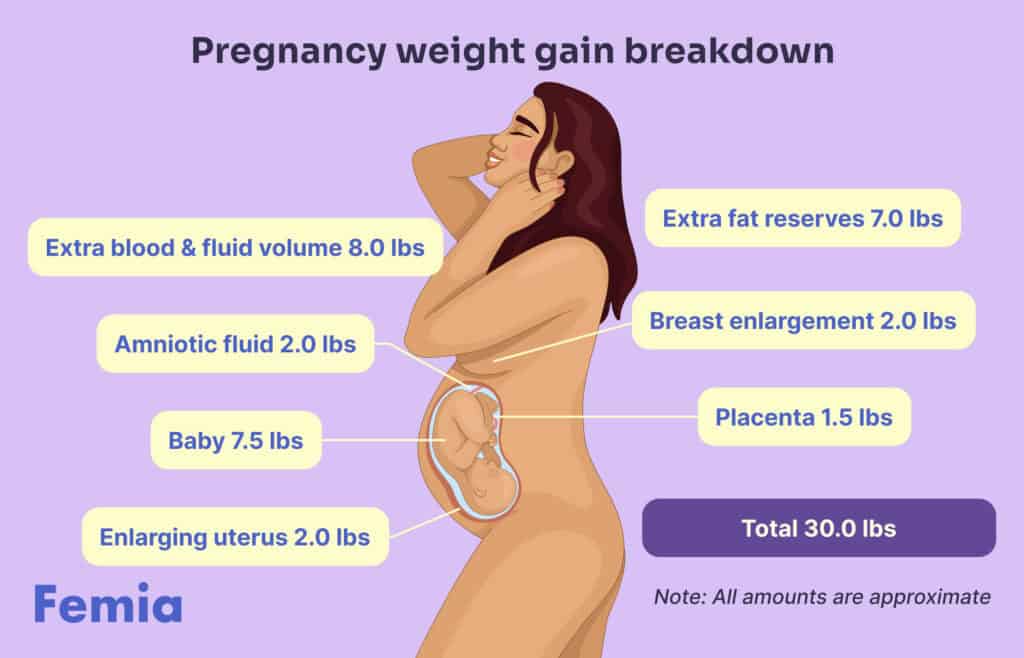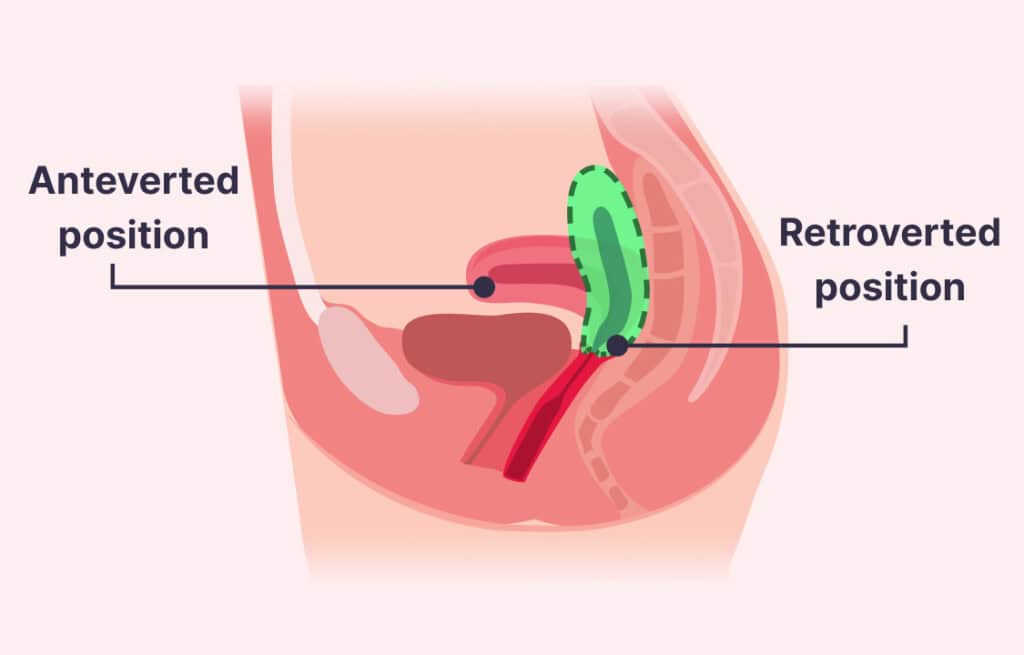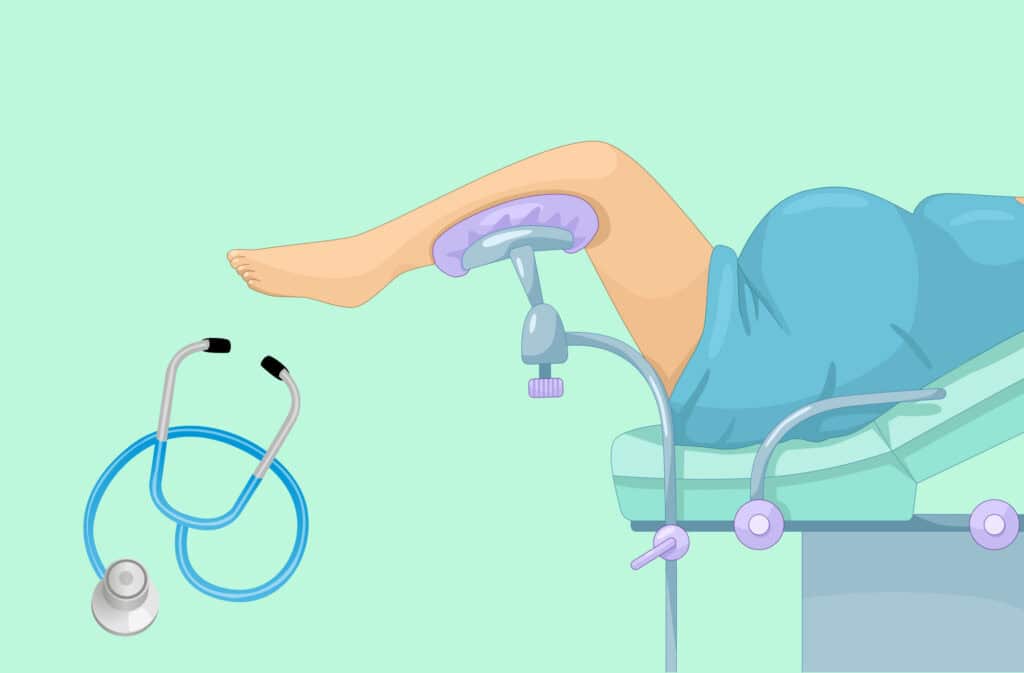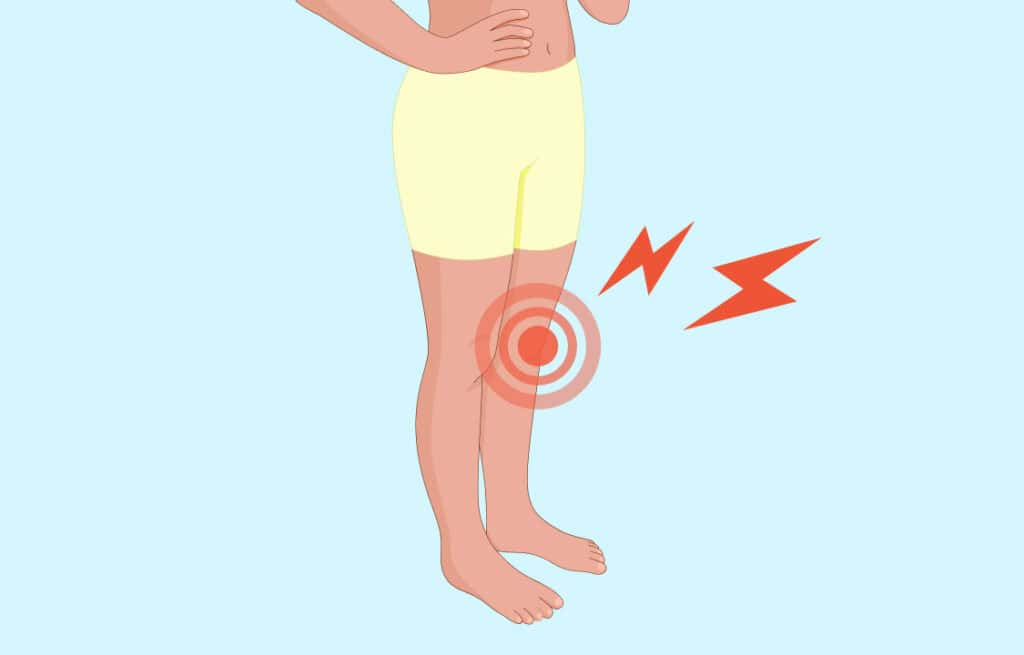Femia > Health Library > Pregnancy > Pregnancy health > Why am I gaining weight so fast during first trimester of pregnancy?
Why am I gaining weight so fast during first trimester of pregnancy?

- Updated Feb 10, 2025
- Published
CRAFTED BY HUMAN
Crafted by human At Femia, we provide accurate and up-to-date information at every stage of your journey, from trying to conceive, pregnancy and postnatal support. All content is created by a real person based on in-depth research and own professional experience. Femia ensures that you will receive expert advice, strict accuracy and a personalized approach from our authors/medical experts. Learn more about our editorial policy.
FACT CHECKED
Fact checked At Femia Health, we maintain the highest standards of editorial excellence in delivering content focused on helping you conceive, guiding you through pregnancy, and supporting you postpartum. Explore our content review principles to learn how we ensure the accuracy and quality of our health and lifestyle tips for every stage of your journey.
- The hormonal changes of early pregnancy can impact your lifestyle and lead to weight gain. You may find you exercise less when battling pregnancy fatigue, and your diet may take a hit as you struggle with pregnancy sickness.
- It’s normal for pregnant women to gain one to five pounds in the first trimester as their bodies adjust to these changes.
- Regular prenatal appointments allow your healthcare provider to track your weight gain and offer timely advice to help you manage it. Make sure you attend all your prenatal appointments for a healthy pregnancy.
Many women wonder, “Why am I gaining weight so quickly in the first trimester?” While it’s common to think weight gain picks up in the third trimester, many notice changes early on. Despite the advice to “eat for two,” your healthcare provider will likely suggest a balanced approach rather than doubling calories. Using a pregnancy weight gain calculator can help you track a healthy gain.
However, try not to worry too much if you’re gaining weight rapidly in your first trimester. It can be challenging to manage your weight during the first trimester when pregnancy hormones leave you tired and nauseous.
weight changes?
Femia helps moms-to-be track their health and understand body changes
What is considered normal weight gain in the first trimester?
You may not gain any weight during the first trimester, but if you do, one to five pounds is normal. If you had a healthy body mass index (BMI) before pregnancy, you should gain between 25 and 35 lbs by the end of your pregnancy.

The important thing to remember is that every body is different, and the rapid hormone changes you’re going through will affect you in a unique way. Some women may lose weight if their morning sickness is severe and makes it difficult to keep food down. On the other hand, intense cravings and aversions might lead to weight gain if the only things you can stomach happen to be fried and sugary.
There’s not much point in obsessing over your diet when you’re struggling with pregnancy sickness, so just focus on getting through each day. There will be plenty of time for healthy eating once the pregnancy sickness passes.
Healthy weight gain during pregnancy depends on your BMI before pregnancy. When you first see your healthcare provider in early pregnancy, they will weigh you to track your weight gain throughout pregnancy. If you have a BMI of under 18.5 or over 30, your healthcare provider will likely discuss how to manage weight gain during pregnancy.
| BMI | Recommended weight gain overall |
|---|---|
| Less than 18.5 (underweight) | 28 to 40 lbs |
| 18.5 to 24.9 (healthy weight) | 25 to 35 lbs |
| 25 to 29.9 (overweight) | 15 to 25 lbs |
| 30 or more | 11 to 20 lbs |
While many medical systems use BMI to calculate weight gain during pregnancy, it’s essential to be aware of its limitations. The system was developed solely using the measurements of white men and didn’t consider muscle mass, abdominal fat, and ethnicity. According to a 2023 article in Cureus, even the inventor of the BMI thought it wasn’t a good way to assess body fat.
If you have a history of eating disorders, discuss this with your healthcare provider, as you may want to refuse discussions of weight. Pregnancy can be particularly stressful for moms-to-be with eating disorders, so be sure to inform your healthcare provider about your medical history. They can ensure you have support in place throughout your pregnancy.
Potential reasons for rapid weight gain in early pregnancy
There are several reasons why you may notice rapid weight gain during early pregnancy, including:
- Increased appetite and pregnancy cravings. The hormonal changes of early pregnancy can mess with your appetite. You may notice food aversions that leave you unable to eat certain foods. The smell alone can be enough to put you off broccoli if you’re battling pregnancy sickness. On the other hand, hormones can increase your appetite and make you feel hungrier than usual. You may also be craving sugary foods. It’s worthwhile being mindful of the foods you eat over the course of a week. Ensure a healthy balance of different foods to keep your cravings in check.
- Fluid retention. During pregnancy, your body will retain more fluid than usual, which can lead to weight gain. According to a 2022 review published in Diabetes Research In Clinical Practice, you will have between two and three pounds of extra fluid (not including amniotic fluid) by the time your baby is born. You may notice this additional fluid on the scales (and when looking down at your ankles).
- Changes in diet and activity level. The first trimester can be rough. It’s hard to live life to the max when battling fatigue and pregnancy sickness. Earlier bedtimes may mean skipping your evening workout, while morning sickness may see you reaching for salty carbs instead of your usual healthy meal choices. The combination of reduced activity and a change in diet could be the reason your pants are feeling snug.
👉Find out more: First trimester pregnancy diet: 1 to 3-month pregnancy diet chart and meal plans
Is it normal to lose weight during pregnancy?
Most women will notice some weight gain by the end of the pregnancy. In addition to your baby’s weight, placenta, and amniotic fluid, your body will store excess fat in preparation for breastfeeding.
If you have a history of eating disorders or issues gaining weight, it’s worth flagging this with your healthcare provider. They may want to keep a closer eye on your weight and perhaps suggest ways you can increase weight gain easily. If you struggle to gain weight, they’ll recommend high-calorie nutritious foods to help you bulk up.
Why am I losing weight during the first trimester?
It’s not unusual to lose weight during the first trimester when hormonal changes can impact your lifestyle. Some women lose weight in early pregnancy after adopting a healthier lifestyle for their baby. If you have increased the amount of exercise you do and switched to a more nutritious diet, you may notice some weight loss in the early stages of pregnancy.
Why am I losing weight during pregnancy in the 2nd and 3rd trimesters?
During the second and third trimesters, most women gain weight, so you might be nervous if you notice the numbers on the scale going down. There are a few reasons why you might lose weight during this period. Firstly, your energy levels may increase after the exhaustion of the first trimester, allowing you to exercise more and burn more calories. Secondly, once the pregnancy nausea passes, you might finally feel ready to chow down on a green salad instead of a bowl of fries.
Ask your healthcare provider for advice if you’re worried about weight loss. They’ll be able to assess your health, determine why you’re not gaining weight, and whether you need to do anything about it.
Not gaining weight in the third trimester: should you be concerned?
If you had a healthy BMI at the start of the pregnancy, you should be eating an additional 450 calories a day in your third trimester. This increase in calories, combined with your baby’s growth, may lead to pregnancy weight gain as you near your due date.
Gaining too little weight could increase your chance of premature birth. It may also increase the risk of a low birth weight (less than 5.5 lbs), which puts your baby at risk of other health problems. However, low weight gain during pregnancy isn’t always bad; some women naturally gain less weight than others. It’s certainly worth discussing with your healthcare provider, so they can explore possible reasons and rule things out.
If you had a BMI of 30 or above before pregnancy, managing your weight during pregnancy requires special attention. While there’s ongoing research in this area, it’s important to follow your healthcare provider’s guidance.
Although current guidelines recommend those with a high BMI aim to gain weight during pregnancy, a recent study contradicts this advice. A 2024 study published in The Lancet found women with high BMIs enjoyed healthier pregnancies when they gained less weight. The authors recommended removing the 5kg weight gain guideline for women with a BMI of 40 or above. Speak to your healthcare provider to assess your weight changes during pregnancy and determine whether they have any concerns.
👉Find out more: Baby fruit size by week: A trimester-by-trimester guide to your growing little one
What to do if you’re losing weight while pregnant
If you notice you are losing weight during pregnancy, speak to your healthcare provider for advice. Regular prenatal appointments allow your doctor to track changes in your weight and offer advice when necessary. Highlight your weight loss, so your doctor can explore the possible causes and offer tailored medical advice. Most of the time, weight loss will be temporary and nothing to worry about, but it’s always worth seeking advice from your healthcare provider.
Tips for healthy weight management during pregnancy
If you want to maintain a healthy weight during pregnancy, here are some things you can try:
1. Stay active
It’s essential to stay active during pregnancy. Regular exercise is vital for keeping your stamina up, so you’re ready for the birth. During pregnancy, you should opt for low-impact exercises that raise your heart rate without putting too much pressure on your body. Swimming, brisk walking, and yoga are popular forms of exercise during pregnancy.
If you find it hard to get out to exercise, especially during the first trimester, don’t be too hard on yourself. If you keep skipping your workout, try moving it to a different time of day. A brisk walk at lunchtime might feel more achievable than a 7 a.m. swim during the peak of morning sickness.
2. Eat a healthy, balanced diet
The food we eat matters, especially during pregnancy. Consider your average weekly diet and the types of food you consume. Are you getting enough fresh fruits, greens, and veggies? Use a food tracker app and input the food you eat for a week. This will show you any missing nutrients or highlight areas where you may be overindulging.
It can be tricky to change your diet, but many women find that pregnancy motivates them to make lifestyle changes. Your diet doesn’t have to be perfect, but you should aim for a healthy balance.
Switching out unhealthy favorites for healthy alternatives is a great starting point. For example, if you like to snack on salty junk food in the evenings, switch to hummus with whole grain crackers.
If you’re feeling a bit lost about what to eat, don’t worry—you’re not alone! Many women find it helpful to talk to a nutrition expert during pregnancy. Your doctor can refer you to a nutritionist or dietician who specializes in prenatal nutrition. These professionals can give you personalized advice and help you make food choices that are just right for you and your baby.
3. Manage cravings
Pregnancy cravings can be tricky, especially if you are craving processed foods. Planning meals and snacks can help reduce the temptation to give in to unhealthy cravings. Easy-to-prepare healthy meals and snacks that don’t require much prep are vital during the first trimester when you’re likely too tired to cook.
You don’t need to ban yourself from giving in to cravings, but try to include the foods you crave as part of a healthy, balanced diet. By all means, have the bowl of ice cream you crave, but top it with fresh fruit and chopped nuts for some healthy nutrients.
Femia offers personalized insights throughout all trimesters
When to seek medical advice
If you have any worries and concerns throughout your pregnancy, speak to your healthcare provider. They are there to care for you and your baby and would always want you to speak up if you have any concerns.
Your prenatal appointments ensure you have regular access to healthcare during pregnancy. Not only does this allow you to build a good relationship with your doctor, but it also ensures they can offer timely medical advice when necessary.
Too much weight gain could increase your risk of pre-eclampsia, gestational diabetes, postpartum weight retention, preterm birth, and high birth weight. Try to keep your pregnancy weight gain in the healthy range for your BMI. Regular exercise and a healthy diet can help you to maintain a healthy weight.
Sudden swelling in the face, ankles, feet, and hands could be a symptom of pre-eclampsia, a serious pregnancy condition that requires immediate medical attention. Pre-eclampsia most often occurs after week 20. Seek emergency medical help if you have symptoms of pre-eclampsia.
Questions from Femia community
I'm gaining weight quickly in my first trimester—<br>could this affect my baby's growth?
Rapid weight gain in the first trimester is unlikely to harm your baby, though you should discuss it with your healthcare provider. Most causes of weight gain during early pregnancy are short-term, and you should notice your weight gain slowing as your pregnancy hormones calm down in the second trimester.
Does putting on weight early in my pregnancy <br>mean I'll have a bigger baby?
No, weight gain in early pregnancy is not a sign of a big baby. Your baby is still tiny at this stage, so your weight gain is just the result of hormonal and lifestyle fluctuations from the pregnancy itself..
There are lots of factors that can influence fetal growth, including genetics, maternal age, and gestational diabetes. However, excessive weight gain over the whole pregnancy is associated with larger babies. For this reason, it’s crucial to try and maintain healthy weight gain during pregnancy. Regular exercise and a healthy balanced diet should help to keep your weight gain in check.
Could the stress I'm feeling be causing changes <br>in my pregnancy weight?
Yes, emotional stress can contribute to changes in appetite and eating habits. You may find yourself skipping meals when you’re stressed and losing weight because you aren’t eating enough calories. Alternatively, when stressed, you might be reaching for sugary foods for a quick dopamine fix, ultimately leading to weight gain.
The bottom line
Your body is busy growing you a baby, so weight changes are a normal and expected part of the process. As your body changes, you’ll notice the numbers on the scales going up. While you might have been conditioned to see this as a bad thing, it’s perfectly normal and healthy during pregnancy. Accept your changing body, and focus on the amazing things it’s doing.
Weight changes during the beginning of your pregnancy might initially feel concerning. But, if you’re maintaining a healthy diet and lifestyle, you can rest assured that it’s all a necessary part of the changes your body is going through. Focus on eating a balanced and nutritious diet, reduce your junk food intake, and exercise regularly. If your weight changes are still concerning you, speak to a healthcare provider or dietician to make sure everything is normal and discuss further lifestyle changes you can make to stay healthy.
References
- Pray & Riskin. “The History and Faults of the Body Mass Index and Where to Look Next: A Literature Review.” Cureus vol. 15,11 e48230. 3 Nov. 2023, doi:10.7759/cureus.48230 https://www.ncbi.nlm.nih.gov/pmc/articles/PMC10693914/.
- Maria Grazia Dalfra’, Silvia Burlina, Annunziata Lapolla, “Weight gain during pregnancy: A narrative review on the recent evidences.” Diabetes Research and Clinical Practice Volume 188, 2022, 109913, https://www.sciencedirect.com/science/article/abs/pii/S0168822722007276.
- Johansson, K “Safety of low weight gain or weight loss in pregnancies with class 1, 2, and 3 obesity: a population-based cohort study.” The Lancet Volume 403, 2024, Issue 10425 https://www.thelancet.com/journals/lancet/article/PIIS0140-6736(24)00255-1/abstract.

How to get pregnant fast with a retroverted uterus? Discover symptoms, impact on fertility, expert tips, and the best sex positions to improve your chances of conception.

Learn about cervical checks during pregnancy, including what to expect, when they typically happen, and how they can help monitor your progress.

Explore an in-depth guide of the symptoms, causes, treatment, prevention, supplements, and natural remedies for menopause joint pain.

